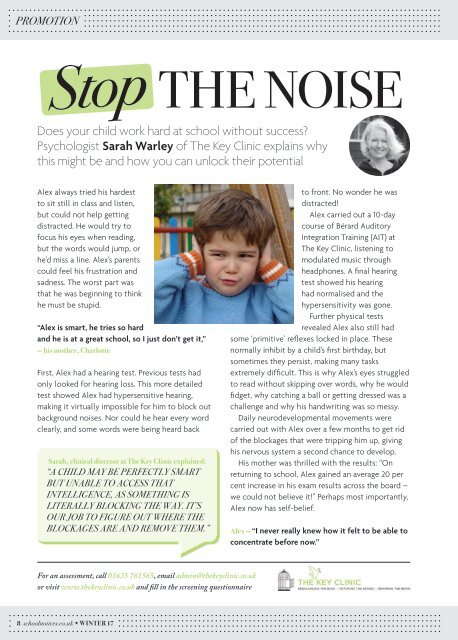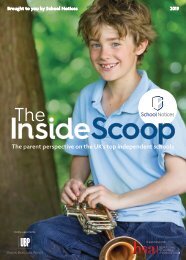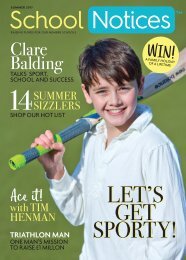Winter Edition 2017
Winter magazine out now! Going to 35,000 families at our member schools, all raising funds for great causes.
Winter magazine out now! Going to 35,000 families at our member schools, all raising funds for great causes.
Create successful ePaper yourself
Turn your PDF publications into a flip-book with our unique Google optimized e-Paper software.
PROMOTION<br />
Stop<br />
THE NOISE<br />
Does your child work hard at school without success?<br />
Psychologist Sarah Warley of The Key Clinic explains why<br />
this might be and how you can unlock their potential<br />
Alex always tried his hardest<br />
to sit still in class and listen,<br />
but could not help getting<br />
distracted. He would try to<br />
focus his eyes when reading,<br />
but the words would jump, or<br />
he’d miss a line. Alex’s parents<br />
could feel his frustration and<br />
sadness. The worst part was<br />
that he was beginning to think<br />
he must be stupid.<br />
“Alex is smart, he tries so hard<br />
and he is at a great school, so I just don’t get it,”<br />
— his mother, Charlotte<br />
First, Alex had a hearing test. Previous tests had<br />
only looked for hearing loss. This more detailed<br />
test showed Alex had hypersensitive hearing,<br />
making it virtually impossible for him to block out<br />
background noises. Nor could he hear every word<br />
clearly, and some words were being heard back<br />
Sarah, clinical director at The Key Clinic explained:<br />
“A CHILD MAY BE PERFECTLY SMART<br />
BUT UNABLE TO ACCESS THAT<br />
INTELLIGENCE, AS SOMETHING IS<br />
LITERALLY BLOCKING THE WAY. IT’S<br />
OUR JOB TO FIGURE OUT WHERE THE<br />
BLOCKAGES ARE AND REMOVE THEM.”<br />
to front. No wonder he was<br />
distracted!<br />
Alex carried out a 10-day<br />
course of Bérard Auditory<br />
Integration Training (AIT) at<br />
The Key Clinic, listening to<br />
modulated music through<br />
headphones. A final hearing<br />
test showed his hearing<br />
had normalised and the<br />
hypersensitivity was gone.<br />
Further physical tests<br />
revealed Alex also still had<br />
some ‘primitive’ reflexes locked in place. These<br />
normally inhibit by a child’s first birthday, but<br />
sometimes they persist, making many tasks<br />
extremely difficult. This is why Alex’s eyes struggled<br />
to read without skipping over words, why he would<br />
fidget, why catching a ball or getting dressed was a<br />
challenge and why his handwriting was so messy.<br />
Daily neurodevelopmental movements were<br />
carried out with Alex over a few months to get rid<br />
of the blockages that were tripping him up, giving<br />
his nervous system a second chance to develop.<br />
His mother was thrilled with the results: “On<br />
returning to school, Alex gained an average 20 per<br />
cent increase in his exam results across the board –<br />
we could not believe it!” Perhaps most importantly,<br />
Alex now has self-belief.<br />
Alex — “I never really knew how it felt to be able to<br />
concentrate before now.”<br />
For an assessment, call 01635 761565, email admin@thekeyclinic.co.uk<br />
or visit www.thekeyclinic.co.uk and fill in the screening questionnaire<br />
8 schoolnotices.co.uk ★ W I N T ER 17

















